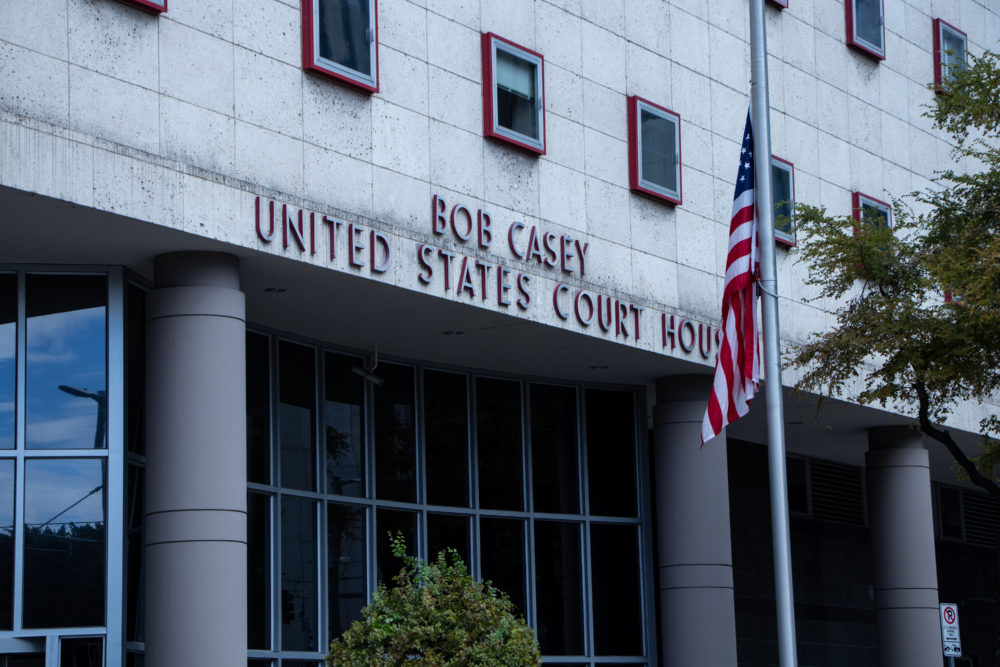The United States government on Tuesday asked a Houston judge for more time to locate a Venezuelan man who attorneys say was deported to El Salvador for his tattoos.
The request came one day after the federal judge ordered government officials to track down the man.
Widmer Agelviz-Sanguino, 24, went through a rigorous vetting process as part of the refugee resettlement program.
But when he arrived to the George Bush Intercontinental Airport in Houston last fall with his family, he was immediately flagged by customs officers for his tattoos — depictions the government argues are associated with a Venezuelan gang known as Tren de Aragua.
The tattoos, his attorney Javier Rivera says, are a collection of things that were important to him. A rose garden reminded Agelviz-Sanguino of planting rose bushes with his grandmother. An owl represented one that would pay him visits on the windowsill of his home, and a clock referenced time spent during his childhood.
During an interview with a U.S. Customs and Border Protection (CBP) officer at the airport, Agelviz-Sanguino said that he received the tattoos in Venezuela and that he and his family earlier fled from Venezuela to Ecuador to escape gang activity, according to his attorney. The reason he was refused entry, according to U.S. Department of Homeland Security documents, was his alleged gang affiliation.
“CBP believed, just out of visual inspection of him, that they were gang affiliations,” Rivera said.
Mid-March was the last time his attorneys and family heard from Agelviz-Sanguino. A May 9 lawsuit filed against U.S. Department of Homeland Security Secretary Kristi Noem and other government officials asserts his deportation was a flagrant disregard for due process and the authority of the immigration court system.
“The family has not heard a word from him and to be honest there’s been no actual proof that he’s actually in CECOT or El Salvador,” Rivera said. “We are basing this off of a news article that was published on CBS with the manifesting list of the Venezuelan individuals that were deported to CECOT.”
The government, Rivera said, has provided no documentation to attorneys or the family that Agelviz-Sanguino has even been sent out of the country.
The Department of Justice declined to comment to Houston Public Media on Tuesday.
RELATED: ICE says it deported more than 500 people in the Houston area in one week
Judge Keith Ellison of the United States District Court in the Southern District of Texas on Monday set three deadlines — the first of which passed on Tuesday to no avail as the government requested more time to find Agelviz-Sanguino. Another deadline was set for Wednesday, when the government will be responsible for facilitating attorney-client communications. The last deadline, according to court documents, is Thursday, when defendants in the case are ordered to detail the steps that were taken to comply with the judge’s orders, including logistical arrangements that were made with El Salvadoran authorities.
The case draws connections to Kilmar Abrego Garcia, a Salvadorian man who lived in Maryland and was deported over an alleged administrative error. His story made national headlines, drawing the ire of President Donald Trump, who last month took to social media claiming Garcia had tattoos that were affiliated with MS-13, an international criminal gang.
It poses another issue — those facing deportation have a significant communications barrier with those hired to represent their cases in court.
“This is an incredibly sticky problem,” Rivera said. “As an attorney, communication with your client is incredibly important. We have to be informed of what is actually happening with them, their condition, what they’re experiencing, their story, what’s happening to them on a daily basis. … All these questions I normally ask my clients when I meet them in person, I can’t ask that.”
After his encounter with federal agents at the Houston airport last fall, Agelviz-Sanguino was transported to a Montgomery County detention facility just north of Houston. He was issued a notice to appear under removal proceedings in which the government had initiated the formal process to deport him.
At that time, he applied for asylum to prevent his removal, despite the fact that he was already granted refugee resettlement, meaning he already fit the definition of a refugee, his attorney said. He was set for a final hearing on April 1, when an immigration judge would have rendered a decision on his asylum.
But on March 15, Agelviz-Sanguino was deported from the U.S. under the Alien Enemies Act of 1798, a centuries-old wartime act that permits the immediate removal of nationals who pose a threat to the U.S. The government’s invoking of the act to deport people is the subject of ongoing court battles.
Copyright 2025 Houston Public Media News 88.7

